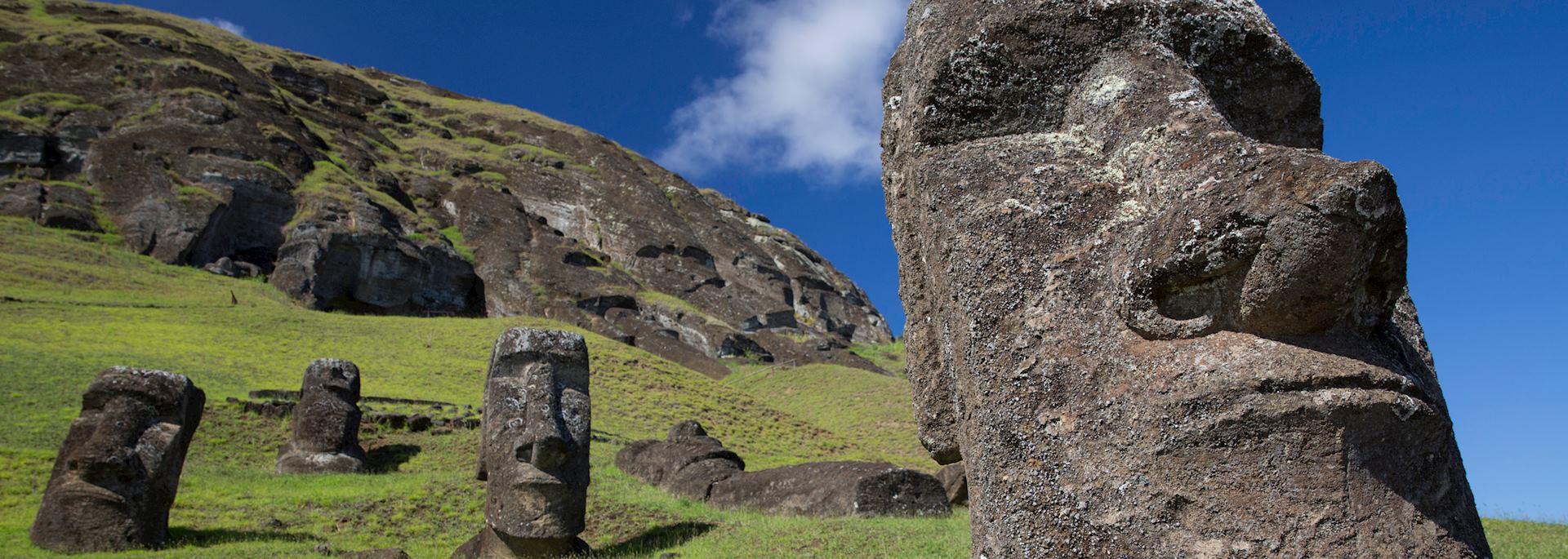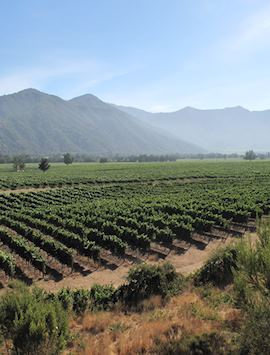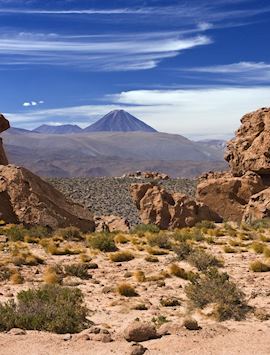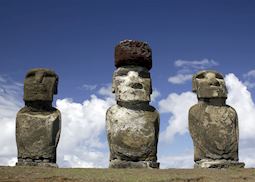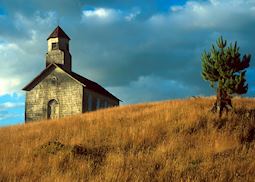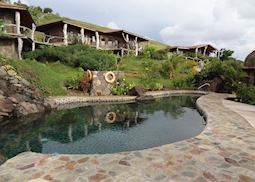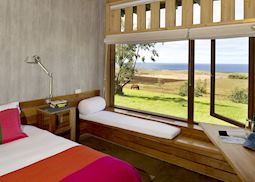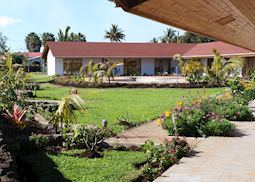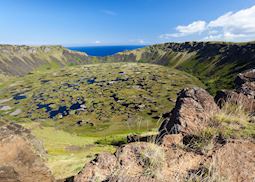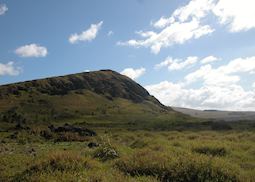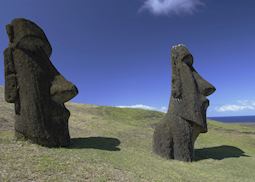Jump to:
From the air, Easter Island is a grain of volcanic rock in the middle of the Pacific. A five-hour flight from Santiago on the Chilean mainland, Easter Island has, for centuries, captivated visitors and scholars alike due to the squatting bodies and brooding faces of hundreds of stone statues or moai. They gaze from all corners of this wind-bruised, grassy and hummocky landmass that’s the very antithesis of the kind of tropical, beachy retreat you might associate with Polynesia. The whole place has a wild, end-of-the-world feel, and in addition to the enigmatic moai, you’ll find a one-of-a-kind island culture and volcanic scenery.
The moai are scattered all around the island’s fringes, and in order to explore them properly you need to tour with a good guide. Believed to have been created between 1500-1700 AD, these great figures (they have bodies, rather than being giant heads) mostly face inland and stand in groups on ceremonial stone-cut platforms ― though several lie half-buried in a quarry. On a guided tour, you can get up close to these impassive monoliths hewn from volcanic tuff, even observing them at sunrise.
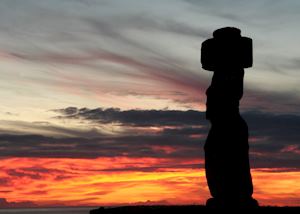
Ahu Tongariki, the biggest and most-photographed platform, is best for this, while sunset is best seen from Ahu Tahai. Some of Ahu Tahai’s moai remain where they’ve been toppled, making the grouping look like a row of broken teeth.
The upright moai you see today were all re-erected to their original position by researchers. Why exactly they were once felled is the topic of much fervent and occasionally quixotic guesswork by academics and islanders. In fact, part of the pleasure of any visit to Easter Island is chewing over the myriad theories about the what, how and why of the moai ― and particularly, what led to their destruction at the hands of their creators.
We recommend touring the moai quarry, which sits at nearly the highest point of the island. In a crater lie several unfinished moai, including one behemoth who measures 21 m (68 ft) in length. If you’re staying at the Explora Rapa Nui, you can also walk the ‘moai path’ along which statues were believed to have been transported using ropes.
Elsewhere around the island you can hike volcanoes, investigate lava tubes, and visit Orongo, the cradle for the ‘birdman’ religion which was thought to have supplanted the moai’s centrality to islanders. It involved a Spartan endurance swim in order to capture the egg of a bird nesting on an offshore island. You can find out more about the ‘birdman’ competition and visiting Orongo in our Easter Island highlights guide.
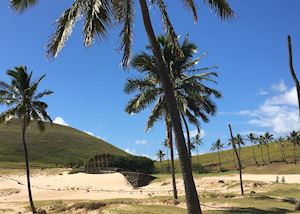
Landscape-wise, Easter Island is barren, treeless and fenceless, and pockmarked with extinct volcanoes, though it’s also incredibly flat in places. It’s fervently green. Horses and cows roam freely, a result of squabbles over land ownership between farmers and Chilean landowners. It feels a little more Polynesian at Anakena, the island’s only beach, which is lined with palm trees and good for swimming if the water isn’t too rough.
Due to the size of Easter Island (approximately 28 km (16 miles) along its longest coast), all the sites we mention here are easily accessible from Hanga Roa, the main town. Slightly bohemian in feel, it’s a small grid of everyday amenities and small hotels and motels. There are few signposts, a quirk of island life, and taxi fares are always exactly the same, no matter where you’re going.
Hanga Roa is also an authentic Rapa Nui (Easter Islander) community, and as you walk the streets you’ll catch snatches of the native language, which is taught alongside Spanish. Rapa Nui residents, who see themselves as culturally distinct from Chile, often sport ancestral tattoos and participate in Polynesian sports ― notably open-canoe racing.
You can visit Easter Island as part of a trip exploring northern Chile or include it in a grand tour of Chile’s highlights.
Best time to visit Easter Island
Easter Island is a year-round destination, though its weather can be unpredictable at all times of year. However, it’s generally more consistent (warm and not overcast) during its summer months (December to February).
who's been there
- 617-223-4950
- Make an inquiry
Suggested itineraries featuring Easter Island
Our itineraries will give you suggestions for what is possible when you travel in Easter Island, and they showcase routes we know work particularly well. Treat them as inspiration, because your trip will be created uniquely by one of our specialists.
Photos of Easter Island
Our expert guides to exploring Easter Island
Written by our specialists from their own experiences of visiting Easter Island, these guides will help you make the most of your time there. We share both our practical recommendations and the best ways to appreciate Easter Island at its best.
-
Our guide to Easter Island ![Moai, Easter Island]()
Our guide to Easter Island
Our guide to Easter Island
Audley travel expert Richard explains how to get the most out of your visit to the mysterious, far-flung Easter Island. He suggests the best ways to see the moai statues as well as other ways to experience the island’s heritage.
Read this guide -
What to do in Chile: our highlights guide ![A church in southern Patagonia, Chile]()
What to do in Chile: our highlights guide
What to do in Chile: our highlights guide
Chile is a land of geographical contrasts, from the arid Atacama Desert to the peaks and glaciers of Patagonia. Cultural differences are equally stark as Spanish-built wooden churches on Chiloé Island vie for the visitor’s attention along with the incongruous and mysterious stone statues on Easter Island.
Read this guide
Accommodation choices for Easter Island
We've selected a range of accommodation options for when you visit Easter Island. Our choices usually come recommended for their character, facilities and service or location. Our specialists always aim to suggest properties that match your preferences.
-
![Pool at Hare Uta]()
Hare Uta
Easter Island -
![Varua (Standard Room), Explora Rapa Nui, Easter Island]() Responsible ChoiceWe've hand-selected a range of tours and stays across the world that go above and beyond to be a force for good by supporting local businesses, educating staff, challenging local norms, or promoting conservation and biodiversity efforts. Your Responsible Choice helps increase the positive impact of your trip.
Responsible ChoiceWe've hand-selected a range of tours and stays across the world that go above and beyond to be a force for good by supporting local businesses, educating staff, challenging local norms, or promoting conservation and biodiversity efforts. Your Responsible Choice helps increase the positive impact of your trip.Explora Rapa Nui
Easter Island -
![Hotel Puku Vai, Easter Island]()
Hotel Puku Vai
Easter Island
Ideas for experiencing Easter Island
Our specialists seek out authentic ways to get to know the places that could feature in your trip. These activities reflect some of the experiences they've most enjoyed while visiting Easter Island, and which use the best local guides.
-
Orongo and Rano Kau ![Rano Kau, Easter Island]()
Orongo and Rano Kau
Orongo and Rano Kau
This half day excursion will take you to visit the extinct volcano, Rano Kau.
View details -
Ahus Vaihu & Akahanga ![View of Rano Raraku, Easter Island]()
Ahus Vaihu & Akahanga
Ahus Vaihu & Akahanga
Visit Ahus Vaihu and the unrestored Akahanga on the south coast of the island. Continue on toward Rano Raraku, a quarry where almost all 900 existing statues were carved, 397 still standing or lying on the slopes of the extinct volcano with a crater lake.
View details -
Ahu Akivi ![Moai, Easter Island]()
Ahu Akivi
Ahu Akivi
This half day excursion takes you to visit a site with three Tahai ceremonial platforms, all of which were restored in 1974.
View details
